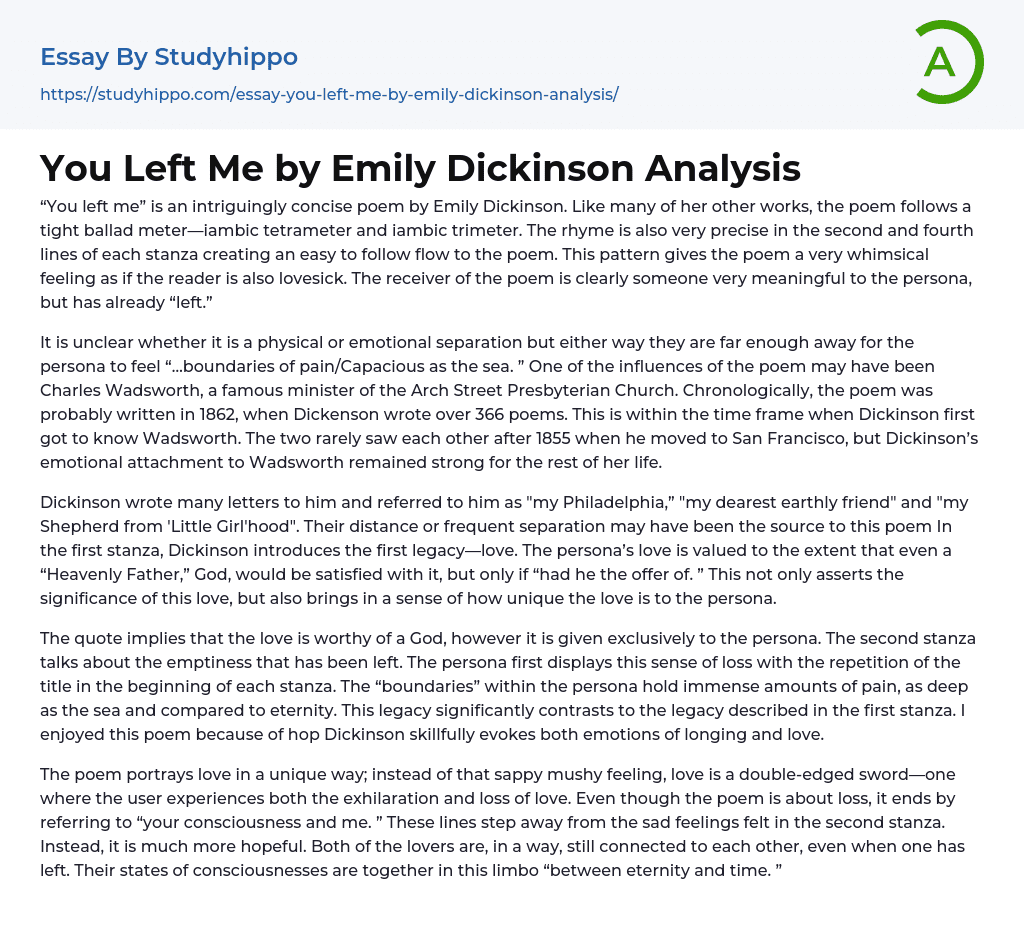“You left me” is an intriguingly concise poem by Emily Dickinson. Like many of her other works, the poem follows a tight ballad meter—iambic tetrameter and iambic trimeter. The rhyme is also very precise in the second and fourth lines of each stanza creating an easy to follow flow to the poem. This pattern gives the poem a very whimsical feeling as if the reader is also lovesick. The receiver of the poem is clearly someone very meaningful to the persona, but has already “left.”
It is unclear whether it is a physical or emotional separation but either way they are far enough away for the persona to feel “…boundaries of pain/Capacious as the sea. ” One of the influences of the poem may have been Charles Wadsworth, a famous minister of the Arch Street Presbyterian Chu
...rch. Chronologically, the poem was probably written in 1862, when Dickenson wrote over 366 poems. This is within the time frame when Dickinson first got to know Wadsworth. The two rarely saw each other after 1855 when he moved to San Francisco, but Dickinson’s emotional attachment to Wadsworth remained strong for the rest of her life.
Dickinson wrote many letters to him and referred to him as "my Philadelphia,” "my dearest earthly friend" and "my Shepherd from 'Little Girl'hood". Their distance or frequent separation may have been the source to this poem In the first stanza, Dickinson introduces the first legacy—love. The persona’s love is valued to the extent that even a “Heavenly Father,” God, would be satisfied with it, but only if “had he the offer of. ” This not only asserts the significanc
of this love, but also brings in a sense of how unique the love is to the persona.
The quote implies that the love is worthy of a God, however it is given exclusively to the persona. The second stanza talks about the emptiness that has been left. The persona first displays this sense of loss with the repetition of the title in the beginning of each stanza. The “boundaries” within the persona hold immense amounts of pain, as deep as the sea and compared to eternity. This legacy significantly contrasts to the legacy described in the first stanza. I enjoyed this poem because of hop Dickinson skillfully evokes both emotions of longing and love.
The poem portrays love in a unique way; instead of that sappy mushy feeling, love is a double-edged sword—one where the user experiences both the exhilaration and loss of love. Even though the poem is about loss, it ends by referring to “your consciousness and me. ” These lines step away from the sad feelings felt in the second stanza. Instead, it is much more hopeful. Both of the lovers are, in a way, still connected to each other, even when one has left. Their states of consciousnesses are together in this limbo “between eternity and time. ”
- Aldous Huxley essays
- Alice Walker essays
- Amy tan essays
- Anne Bradstreet essays
- Anton Chekhov essays
- Arthur Miller essays
- Augustine essays
- Bertolt Brecht essays
- Booker T Washington essays
- Carol ann duffy essays
- Charles Dickens essays
- Charlotte Perkins Gilman essays
- Chinua Achebe essays
- Christina Rossetti essays
- Consider The Lobster essays
- Edgar Allan Poe essays
- Elizabeth Bishop essays
- Emily Dickinson essays
- Ernest Hemingway essays
- F. Scott Fitzgerald essays
- George Orwell essays
- Harper Lee essays
- Homer essays
- James Baldwin essays
- Jane Austen essays
- John Donne essays
- John Steinbeck essays
- Kate Chopin essays
- Kurt Vonnegut essays
- Langston Hughes essays
- Leonardo Da Vinci essays
- Mark Twain essays
- Mary Shelley essays
- Maya Angelou essays
- Nathaniel Hawthorne essays
- Oscar Wilde essays
- Percy Bysshe Shelley essays
- Peter Skrzynecki essays
- Phillis Wheatley essays
- Poets essays
- Ralph Waldo Emerson essays
- Ray Bradbury essays
- Richard Rodriguez essays
- Robert Browning essays
- Robert Frost essays
- Robert Louis Stevenson essays
- Seamus Heaney essays
- Sherman Alexie essays
- Sophocles essays
- Stephen King essays




